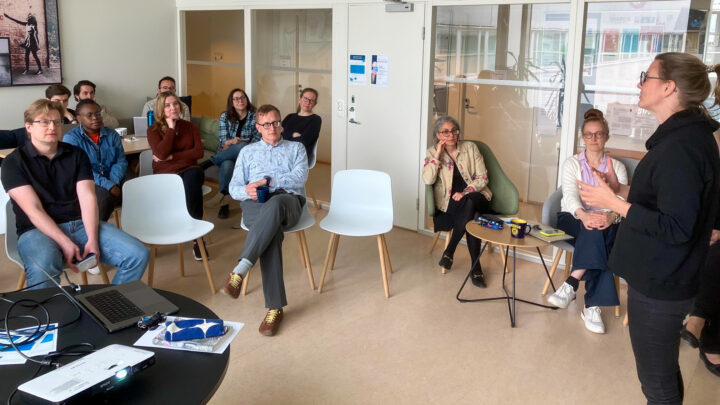INVEST has updated its mission and redefined its thematic research areas
INVEST Flagship Research Centre INVEST has revised its mission and updated its research themes. These changes are part of INVEST’s preparations for a new phase: the current Flagship funding by the Research Council of Finland continues until the end of 2026, after which INVEST will continue as a department at the University of Turku.
According to its updated mission, INVEST is an internationally leading research centre studying inequality and wellbeing unfolding from the early life-course onwards. The cross-disciplinary research addresses societal changes brought on by demographic trends, digitalization and polarization. The goal is to improve the sustainability of the welfare state with evidence-based interventions and investments.
Alongside the revised mission, INVEST’s research has been reorganised under five thematic areas: Socioeconomic and Intergenerational Inequality; Demographic Change and Family Dynamics; Psychosocial Wellbeing and Mental Health of Children and Youth; Education, Skills and Learning, and Public Health and Health Equity.
– These themes help us better communicate what we do at INVEST, but they also serve as an internal message, says Christina Salmivalli, Vice Director of INVEST. – In our everyday work, we often speak of INVEST sociology, INVEST psychology, or INVEST child psychiatry, but through these thematic areas, we emphasize that we are not just representing our individual disciplines – we are part of a multidisciplinary approach to understanding societal change.
Spring meetings kicked off thematic collaboration
The new themes are designed to broadly support INVEST’s research activities. They are also cross-cut by goals such as impactful interventions and policy engagement, methodological development, and interdisciplinary collaboration.
To spark collaboration within the new themes, informal meetings were held in the spring. During these sessions, thematic leads outlined the goals of each area and researchers shared their own work. The meetings were also used to discuss ways of strengthening future cooperation.
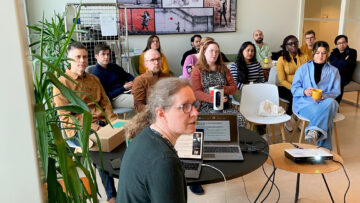
Professor Elina Kilpi-Jakonen (front left) leads the theme Socioeconomic and Intergenerational Inequality. The research under this theme covers causes and consequences of changing socioeconomic inequalities, subjective wellbeing, and intergenerational inequalities. The researchers examine how the welfare state, in terms of benefits, services, policies and institutions, influences different types of inequalities.
The goal of the thematic area is to clarify the mechanisms influencing socioeconomic inequalities within and between countries as well as the perpetuation of inequalities across generations. Researchers study both social and biological (genetic) pathways as well as their interplay.
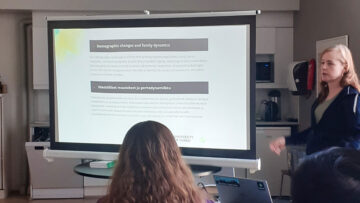
Professor Marika Jalovaara leads the Demographic Change and Family Dynamics theme.
The demographic landscape is shifting with growing migrant populations, rising family instability, and declining fertility accelerating population ageing, impacting societal sustainability. Demographic processes are tied to social and economic inequalities, shaping (dis)advantages across life courses and generations. In this thematic area the researchers seek to identify the causes, consequences, and policy responses to these changes.
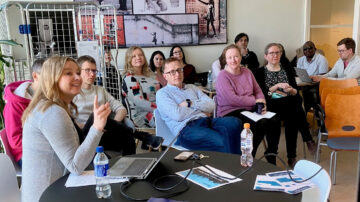
Professor Kirsi Peltonen (front left) leads the theme Psychosocial Wellbeing and Mental Health of Children and Youth.
The psychosocial well-being of children and adolescents is examined from the perspective of risk and protective factors, exploring, for example, the influences of family, peer relations, and the broader society. Mental health research focuses on both epidemiological and intervention studies. These studies investigate the prevalence of psychological disorders in children and adolescents, the factors influencing them, and the effectiveness of programs designed to prevent or mitigate symptoms.
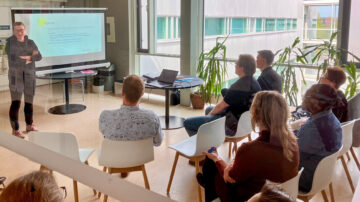
Professor Johanna Kaakinen (front) leads the theme Education, Skills and Learning. This area explores factors related to the education, skills, and learning of children, young people, and adults are examined from both psychological and sociological perspectives, using a variety of research data. The aim is to understand the psychological, social, and societal factors — as well as education-related phenomena — that influence the learning of essential skills and competencies in both current and future societies.
Professor André Sourander leads the Public Health and Health Equity theme, which will formally present itself in autumn 2025.
The Public health and health equity research theme explores the developmental pathways of mental health from the fetal stage to adulthood. In particular, the research will focus on the well-being, health behavior and changes of children and adolescents, as well as early psychosocial and biological risk factors and protective factors for mental health.
Supported by epidemiological knowledge, digital early interventions designed for low-threshold mental health work will be developed and studied. The interventions are implemented in the wellbeing services counties in Finland both in Finnish and Swedish and the interventions are also being developed for minority groups. The effectiveness of the interventions will be examined in both RCT and implementation studies.

